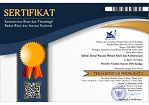In search of peace: Ahmadi women’s experiences in conflict transformation
Abstract
In the last few years, religious conflicts involving a minority Muslim group, Ahmadiyya, have risen
dramatically in Indonesia; the most recent being the attack on the Ahmadiyya community in Cikeusik
Banten, West Java, where three Ahmadis were killed and the sealing of Al Mishbah Mosque by local
government of Bekasi West Java. Understanding the context of violent conflict and the ways individual
Ahmadi women take agency to challenge such oppression is an important first step in creating a more
equitable and peaceful Indonesia. To examine the experience of Ahmadi women exercising their agency
in conflict transformation, this qualitative research was conducted in four areas of Indonesia: Bogor,
Kuningan, Yogyakarta and Lombok, by gathering data from the narratives of Ahmadi women who
actively participate in Lajnah Imaillah, an Ahmadiyya’s women’s organization. This research highlights
three stages of conflict transformation that the women employed: 1) asking for government help; 2)
taking physical action to defend their rights; and 3) defining themselves as Indonesian citizens who have
the same rights as others. Through these actions, they show their ability to help others, transforming
the conflict by forming better relationships and understanding with other Indonesian citizens.
dramatically in Indonesia; the most recent being the attack on the Ahmadiyya community in Cikeusik
Banten, West Java, where three Ahmadis were killed and the sealing of Al Mishbah Mosque by local
government of Bekasi West Java. Understanding the context of violent conflict and the ways individual
Ahmadi women take agency to challenge such oppression is an important first step in creating a more
equitable and peaceful Indonesia. To examine the experience of Ahmadi women exercising their agency
in conflict transformation, this qualitative research was conducted in four areas of Indonesia: Bogor,
Kuningan, Yogyakarta and Lombok, by gathering data from the narratives of Ahmadi women who
actively participate in Lajnah Imaillah, an Ahmadiyya’s women’s organization. This research highlights
three stages of conflict transformation that the women employed: 1) asking for government help; 2)
taking physical action to defend their rights; and 3) defining themselves as Indonesian citizens who have
the same rights as others. Through these actions, they show their ability to help others, transforming
the conflict by forming better relationships and understanding with other Indonesian citizens.
Keywords
Conflict transformation; Ahmadiyya; Ahmadi women; Peace; Conflict
Full Text:
PDFDOI: https://doi.org/10.18326/ijtihad.v15i1.61-82
Refbacks
- There are currently no refbacks.
Ijtihad: Jurnal Wacana Hukum Islam dan Kemanusiaan by http://ijtihad.iainsalatiga.ac.id/ is licensed under a Creative Commons Attribution-ShareAlike 4.0 International License







